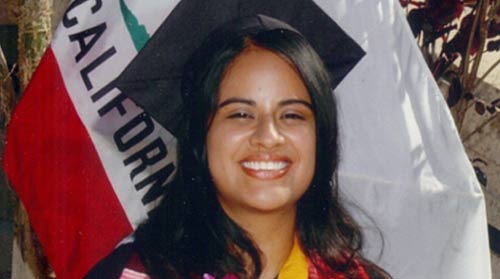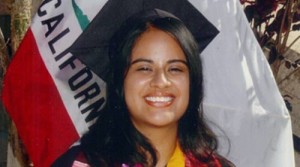From Tijuana, Ex Dreamer Calls For Immigration Reform

 By Jacqueline Guzmán-Garcia, New American Media
By Jacqueline Guzmán-Garcia, New American Media
(This story was originally published in El Nuevo Sol, and translated by Elena Shore)
LOS ANGELES–Nancy Landa was working in the public sector at a California organization that fateful September in 2009, when she was 29. She had graduated with honors in 2004 with a degree in business administration from California State University, Northridge (CSUN), and had a steady job. Everything seemed normal.
All of a sudden, at the Third Street entrance to Highway 710 N toward Long Beach, Landa was stopped by two immigration officials. They got out of a van and, without showing her any official documentation, told her she was under arrest.
“I’m dreaming — it’s a nightmare,” Landa thought as she climbed in the vehicle with four other people, heading to a detention center in downtown Los Angeles.
“I knew in that moment that what I had built in the United States, my life, was over. It was hard to take in what happened next,” she said.

Obama’s Deportation Record
Without knowing it, Landa and her family, who were also deported after this incident, became yet another statistic, four of the more than 1.2 million people who have been deported since 2009, estimated by the Pew Hispanic Center. Under President Barack Obama, more people have been deported each year than under any other president in U.S. history.
In spite of this, on June 15, President Obama announced the establishment of the Deferred Action for Childhood Arrivals (DACA) plan for young people who, like Landa, were brought to the United States as children. DACA is expected to benefit about 1.4 million young people. However, young people Landa’s age will not qualify, since deferred action is limited to those who were under 31 years old as of June 15, 2012.
Landa, her parents and her younger brother emigrated from Mexico to the United States when she was nine years old. She grew up in South Central Los Angeles and as a result of her good grades was able to go to Pacific Palisades Charter School.
“Being in high school, I knew I had the challenge of going to college because I was undocumented,” she said. “My parents didn’t have the money to pay for it.”
As a result of her exceptional performance in school, she won the prestigious “Gates Millenium” award, but then learned that she could not receive the scholarship because of her immigration status.
“They asked me to fill out information for FAFSA [Free Application for Federal Student Aid] and I couldn’t do it,” she explained. “That scholarship would have paid for all my college expenses.”
Despite this, Landa finished high school with honors in 1998, graduating with a top-level grade-point average. She applied for other scholarships from private organizations and started college at CSUN that year.
In 2003 she became the first Latina — and second undocumented — student president of CSUN. The university’s first undocumented student president was Vladimir Cerna (1996-97), a student from El Salvador, who announced his immigration status in the middle of the controversy over California’s Prop 187, the anti-immigrant ballot measure passed in 1994.
Life Seemed Perfect
While Landa was pursuing her college career, her parents were trying to resolve the family’s immigration status. In a stroke of luck, they managed to get work permits for themselves and their two children.
Landa got her first work permit two months after graduating from CSUN, and life seemed perfect. She started working in the public sector, managing educational initiatives and economic and labor development.
However, her happiness was short lived. She wasn’t able to renew her visa, even though the notary in charge of her family’s case had charged them $5,000 for the process. That was when immigration authorities arrested her as she approached the freeway.
“I managed to send a text to a friend, asking her to let my parents know,” Landa remembers. “Later [the immigration agents] took my purse, my cell phone, all official documents and kept them.”
“I couldn’t believe it,” says Karla V. Salazar, Landa’s friend who received the text message. “Immediately a group of friends started calling different pro-immigrant organizations and friends who could give us advice. Unfortunately, we weren’t able to prevent her deportation.”
In a moment of desperation, Landa’s parents decided to call the notary, thinking that she could help resolve the case. But Landa had doubts about her honesty. “I knew I couldn’t trust her because it was thanks to her that I was there,” she said.
Landa, who said she never saw the deportation order, suspects the notary applied for political asylum for the whole family. However, authorities couldn’t find enough proof showing the Landas were in “extreme danger” and would qualify. Instead of getting legal status, they received a deportation order.
Without being able to do anything about it, Landa’s world took a 180-degree turn in eight short hours. At the detention center, she was fingerprinted and put in a cell.
“They lock you up in there with everyone,” Landa says. “I spent like eight hours there.”
She recalled, “The immigration official told me I didn’t have any choice, they already had the judge’s order, and that same day they were going to kick me out of the country.”
Landa managed to call her parents. When she told them they were taking her to Tijuana that day, her parents said they had spoken with the notary and had paid her more money for help. But Landa knew the notary had no legal recourse to stop her deportation. “I told my parents not to pay that lady anything,” she said, convinced the notary was lying.
A few minutes later, Landa was put on a bus headed to Tijuana.
“I Was Scared”
“I was scared. I didn’t know what Tijuana was like,” she says. “I knew it was very dangerous. I didn’t know how I would reach my friends. And I didn’t know what to do, where I was going to stay. I was worried because I didn’t have any answers.”
When she got to Tijuana, they returned her belongings to her and handed her the deportation order, which said she couldn’t enter the United States for another 10 years.
Salazar and three other friends got together to help Landa.
“I’m Nicaraguan and I remembered how scared I was as a child crossing the Central American border with Mexico and the U.S.-Mexico border,” Salazar said. “I couldn’t turn my back on Nancy. I prayed to all the saints, I prayed to God and there was no turning back.”
Salazar’s greatest fear was what might happen to her friend at night, left by herself and not knowing anyone.
“As a woman, a mother and an immigrant, it broke my heart to know that Nancy had been abandoned on the border like garbage, regardless of all of her achievements and contributions,” she said.
The group of friends took Landa to a relative’s house in Tijuana.
“They let me stay there for a few days,” Landa says. “The next weekend [my friends] came back to visit me and they collected donations to cover my living costs.”
It wasn’t too long before Landa was able to get her savings from Los Angeles to support herself.
In Tijuana, Landa contacted attorney Nikhil Shah, whom she had met at a MALDEF event in Los Angeles. She wanted to reopen her case, even if they might lose, but her first goal was to report the notary who had committed fraud.
“I wanted to document the notary’s fraud,” says Landa, “because if you check all my documents, there is no information from the notary, because she filled out the paperwork in a way that looks like I had done it myself, without any legal advice.”
In October 2009, her parents and her brother were also deported to Tijuana. William Landa, her brother, was arrested at work, and her parents were taken from their home at 5:30 in the morning.
“My parents lived with other undocumented people,” Landa said. “Immigration didn’t have a deportation order for their neighbors, but since they were all living together and they were all undocumented, they were all handcuffed and taken away.”
Know Your Rights
Landa added that’s why it’s important for undocumented immigrants to know their rights: “It’s obvious that [U.S. Immigration and Customs Enforcement] is not following the proper process.”
Landa’s lawyer, Shah, said that as a result of the notary’s fraud, the options available for his client to adjust her immigration status are very limited.
Shah continued, “In general, the penalty is 10 years for deportees before they can return home.”
“The only ones who can return are undocumented immigrants who are married to U.S. citizens or whose parents are U.S. citizens or legal residents . . . and they fill out a letter saying the U.S.-citizen relative could suffer extreme hardship if the undocumented immigrant does not return.”
Landa’s situation doesn’t qualify her for this kind of hardship waiver.
Three years have passed since her deportation and even though she is in her native country, she said the problem of being undocumented still haunts her.
“My work options are limited because if I have to go to the United States, I can’t,” she said. “I can’t get a work visa, let alone a tourist visa to be able to go shopping on the other side of the border.”
When Landa heard about Obama’s deferred action plan, she decided to write a letter to the president to tell him about the injustice of U.S. immigration laws.
“We aren’t criminals,” stressed Landa. “It isn’t fair to kick us out of the country for so many years.”
“The reality is that under your administration, deportation of non‐criminal undocumented immigrants has increased and has contributed to more family separations than during the eight years of the George W. Bush presidency,” Landa writes in her letter to the president.
“The failure to take action earlier has irreversibly impacted the lives of hundreds of immigrants that are thrown out of the U.S. on a daily basis,” she adds.
“I and my family are among that number,” Landa’s letter goes on. If deferred action had been established earlier, there would have been fewer deportations of outstanding Dreamer students like her.
Landa’s letter to President Obama proposes that the U.S. government to consider the following options:
Increasing accountability of the U.S. Immigration and Customs Enforcement agency and their deportation procedures;
Removing the 10‐year ban for deportees so they can successfully appeal their cases;
Reforming the visa process so deportees who are working in their country of origin and are required to travel to the United States for business purposes are not ineligible for a visitor’s visa.
This article was first published in New American Media.
New America Media is the country’s first and largest national collaboration and advocate of 2000 ethnic news organizations. Over 57 million ethnic adults connect to each other, to home countries and to America through 3000+ ethnic media, the fastest growing sector of American journalism. Founded by the nonprofit Pacific News Service in 1996, NAM is headquartered in California with offices in New York and Washington D.C., and partnerships with journalism schools to grow local associations of ethnic media.
[Photo by El Nuevo Sol]
